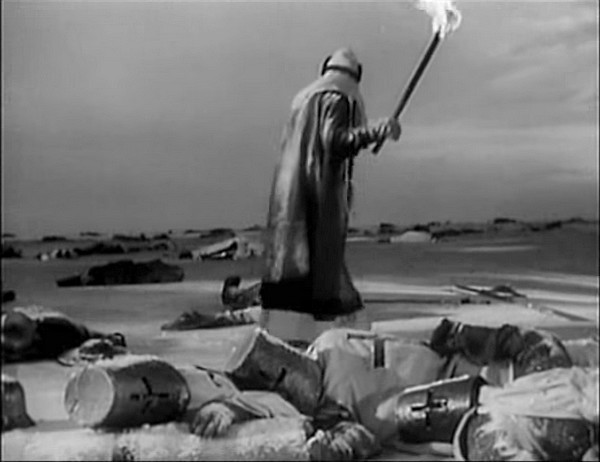
On 23 November 1938, Alexander Nevsky, a film directed by Sergei Eisenstein, was successfully premiered in Moscow. The film recreated an episode that took place in Novgorod in the 13th century: an army composed mostly of peasants achieve the victory over the foreign invader, an army mostly of knights. As if this were not enough, the final battle was fought over the ice of Lake Peipus and, as you can imagine, Eisenstein didn't miss the opportunity of filming an epic scene.
The music that Sergei Prokofiev wrote for the film made a deep impression on the director, who appears to have finished the editing of the battle scene according to the composer work; the audience also appreciate the music, and Prokofiev's friends encouraged him to reelaborate it, as he had done previously with Lieutenant Kijé, his first film music. He wrote a cantata that same winter; lucky us, because the score of the film music got eventually lost. Prokofiev complained that rewriting the music had been more difficult than composing a new one, but the effort was well worth and Alexander Nevsky, Op. 78 was a huge success and it soon became part of the symphonic repertoire. In those years when sound cinema began, this cantata and the suite of Lieutenant Kijé became the first soundtracks to go into the concert hall.
The cantata, for mezzo-soprano, choir and orchestra, has seven parts. The sixth one is a song referring to a secondary plot of the film: young woman Olga Danilovna is courted by two knights, Vasily Buslai and Gavrilo Oleksish, and she tells them that she will marry the bravier during the battle. Both friends fight side by side, and both survive despite being wounded; Vasily declares that Gavrilo was more courageous than him, and also declares that the most courageous soldier was Vasilisa, a young woman. Eventually, Gavrilo will marry Olga and Vasili, Vasilisa; but before that, Olga and other women walk through the battlefield looking for their men, while we listen to Мёртвое поле (Miortvoie pole, "The Field of the Dead"), a song with text by poet Vladimir Lugovskoy.
I think that Alexander Nevsky is a fantastic work, and I specially like The Field of the Dead; sooner or later, I would have shared it here even though, technically, it's not Art Song; you know, that small musical excursions that I make from time to time. However, it won't be necessary this time, because I discovered not long ago there's a version of The Field of the Dead for voice and piano, and there's also a recording from 2019, with mezzo Margarita Gritskova and pianist Maria Prinz.
I must admit that I'm not sure Prokofiev himself made the arrangement; The booklet of this recording doesn't say anything about it, but the complete recording of Prokofiev's songs made by Delos label in 2000 doesn't include those of Alexander Nevsky and Lieutenant Kijé, because the composer didn't write himself the versions for voice and piano. On the other hand, the catalogue of works by the composer edited by Sikorski, updated in 2013, does include the Three Songs by Alexander Nevsky, Op. 78b, dated also in 1939 and dedicated to Eisenstein. And that's all I know about it; as always, if someone has more information and wants to share it, I would be very grateful.
I told you before the score of the film's music got lost, but German conductor Frank Strobel reconstructed the work in 2003. As a bonus-track, I suggest that we also listen to The Field of the Dead in the context of the film; the performers are mezzo-soprano Marina Domashenko and the Rundfunk-Sinfonieorchester Berlin directed by Strobel. I linked the video from our point of interest, but you can watch the whole film. Just saying.
I hope you like the first song by Prokofiev on Liederabend!
Ia poidu po poliu belomu,
Poletxu po poliu smertnomu,
Poisxu ia slavnikh sokolov,
Jenikhov moikh - dobrikh molotsev.
Ktolejit metxami porubleni,
Kto lejit streloiu poraneni,
Napaili oni kroviu aloiu
Zemliu txesnuiu, zemliu ruskuiu.
Kto poguib za Rus smertiu dobroiu,
Potseluiu togo v otxi mertvie,
A tomu molodtsu, txto ostalsia jit,
Budu vernoi jenoi, miloi ladoiu.
Ne vojmu v mujia krassivogo -
Krassota zemnaia kontxaietsia,
A poidu ia za khrabrogo -
Otzovitessia, iasni sokali!
Я пойду по полю белому
Полечу по полю смертному,
Поищу я славных соколов,
Женихов моих - добрых молоцев.
Ктолежит мечами порубленый,
Кто лежит стрелою пораненый,
Напаили они кровю алою
Землю чесную, землю рускую.
Кто погиб за Русь смертью доброю,
Поцелую того в очи мертвые,
А тому молодцу, что остался жить,
Буду верной женой, милой ладою.
Не вожму в мужя красивого -
Красота земная кончается,
А пойду я за храброго -
Отзовитеся, ясный сокалы!
Please follow this link if you need an English translation.













Comments powered by CComment